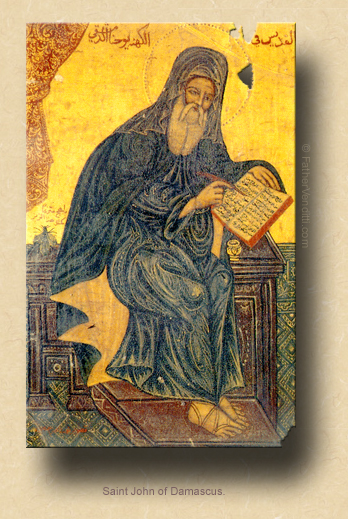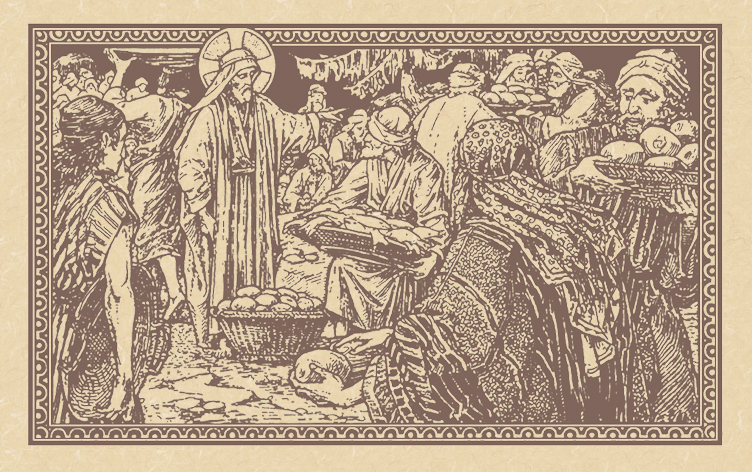Even Miracles Need Raw Materials.
The First Wednesday of Advent; or, the Memorial of Saint John Damascene, Priest & Doctor of the Church.
Lessons from the feria, according to the ordinary form of the Roman Rite:
• Isaiah 25: 6-10.
• Psalm 23.
• Matthew 15: 29-37.
|
When a Mass for the memorial is taken, lessons from the feria as above, or from the proper:
• II Timothy 1: 13-14; 2: 1-3.
• Psalm 19: 8-11.
• Matthew 25: 14-30.
[or, 25: 14-23.]
…or, any lessons from the common of Pastors for One Pastor, or the common of Doctors of the Church.
|
The Third Class Feast of Saint Peter Chrysologus, Bishop, Confessor & Doctor of the Church; the Commemoration of the First Wednesday of Advent; and, the Commemoration of Saint Barbara, Virgin & Martyr.*
Lessons from the common "In médio…" of a Doctor of the Church, according to the extraordinary form of the Roman Rite:
• II Timothy 4: 1-8.
• Psalm 36: 30-31.
• Matthew 5: 13-19.
|
If a Mass for the commemoration of St. Barbara is taken, lessons from the common "Loquébar…" of a Virgin Martyr:
• Ecclesiasticus 51: 1-8, 12.
• Psalm 44: 8.
• Matthew 25: 1-13.
|
FatherVenditti.com
|
 10:00 AM 12/4/2019 — John Damascene, whose Memorial we celebrate today and who went home to the Lord in the year 749, is considered the last of the great Fathers of the Church, those early apostolic and sub-apostolic writers to whom the Church owes so much of her theological and spiritual development. He is also a Doctor of the Church, the title the Church gives to those saints whose work was so important in formulating the deposit of faith so as to stand next to the Scriptures in influence. John Damascene, which is just an anglicized way of saying John of Damascus,—he was Syrian—formulated much of the theological language we use today to refer to the Perpetual Virginity of the Mother of God, and anticipated the Dogma of the Immaculate Conception centuries before anyone had even uttered those words. 10:00 AM 12/4/2019 — John Damascene, whose Memorial we celebrate today and who went home to the Lord in the year 749, is considered the last of the great Fathers of the Church, those early apostolic and sub-apostolic writers to whom the Church owes so much of her theological and spiritual development. He is also a Doctor of the Church, the title the Church gives to those saints whose work was so important in formulating the deposit of faith so as to stand next to the Scriptures in influence. John Damascene, which is just an anglicized way of saying John of Damascus,—he was Syrian—formulated much of the theological language we use today to refer to the Perpetual Virginity of the Mother of God, and anticipated the Dogma of the Immaculate Conception centuries before anyone had even uttered those words.
It’s painfully obvious that this event of feeding a hillside full of people with seven loaves of bread and a few fish has little to do with hunger or magic tricks as it does with feeding the world with the Body and Blood of Christ.
And there is the symbolism of the Holy Eucharist all over this passage. For example, when He sits down with everyone gathered around Him, the first thing He does is heal the sick. Why? Because in order to receive Holy Communion one must be free from sin.
When our Lord commands the disciples to feed the people with the meager supplies on hand, they complain that it won’t be enough; but our Lord presses them on, reminding them that what they are going to accomplish will be done by His power, not their own … just like a priest does at the altar: he doesn't change bread and wine into our Blessed Lord's Body and Blood; Christ does it working through him.
Then after He breaks the bread, He gives the bread and fish to the disciples to distribute to the people; He doesn’t distribute it Himself. That’s because Christ entrusts the Holy Eucharist to His Church, particularly His priests, without whom there could be no Eucharist.
 Then Saint Matthew goes on to tell us that they all ate and were satisfied. Of course they were, because the Body and Blood of the Lord is not food in the conventional sense, but spiritual food, the actual life of the risen Savior. No ordinary food could satisfy that completely. And it wasn’t just some who were satisfied, nor even most: the Evangelist says that all were satisfied, because the Eucharist is the remedy for all sin, for all people. Then Saint Matthew goes on to tell us that they all ate and were satisfied. Of course they were, because the Body and Blood of the Lord is not food in the conventional sense, but spiritual food, the actual life of the risen Savior. No ordinary food could satisfy that completely. And it wasn’t just some who were satisfied, nor even most: the Evangelist says that all were satisfied, because the Eucharist is the remedy for all sin, for all people.
And when it was all over, they took up seven baskets of leftovers, in much the same way that we keep “leftover” hosts of the Blessed Eucharist in our tabernacles in church. And the baskets are left over because the Eucharist, once we partake of it, cannot remain dormant within us, but must be carried with us into the world, so that the life of Christ which we receive can be shared with everybody.
Of course, our Lord’s disciples were not thinking of these things when our Lord performed this miracle;—and He did it twice—they were probably thinking, “Gee, what a great trick. Wish I could do a trick like that.” Whether they remembered it on the night of the Last Supper we’ll never know. But they certainly remembered it later, and so did the Fathers of the Church. Saint Jerome, in the fourth century, wrote,
The Apostles had not yet received the power to consecrate and distribute the Bread of Heaven, the Eucharist; yet Jesus, with a symbolic act, to nourish the hungry crowd, did not create new food, but took that which was in the hands of His disciples, and blessed it.
It explains a great deal about the Holy Priesthood and the sacraments: the priest is necessary to perform the mysteries, but it’s the power of Christ that makes them happen. And even in our own individual lives, everything we do that’s good is done by the grace of God acting through us.
That being said, it is a fact that our Lord does not supply all of this miracle Himself: He still chooses to require the raw materials from us, just as he used the loaves and fish, meager and insufficient as they were, to feed the multitude; which surely points to the fact that grace is not completely a gift, but relies on our own efforts to make it work within us. And when we are open to receiving that grace, we can do what we were tempted to think was impossible. We can confront, for example, some moral teaching of the Church and say to ourselves, “Well, I can’t do this; it’s impossible!” almost as impossible as feeding a multitude of people with seven loaves of bread and a few fish. What makes it possible, of course, is Christ, who said, "With God, all things are possible."
And so it must be with us. There is no burden that the Gospel imposes on us that cannot be met with the grace of Christ. Remembering that at all times, especially in times of temptation, can make all the difference.

* In the extraordinary form, Third Class Feasts during Advent must be observed, with the Advent feria commemorated with the ferial Collect, Secret and Postcommunion added to those of the feast. Any additional commemorations for saints may be observed at the discretion of the priest, with the Advent feria being observed as a commemoration in the same way. Cf. the post here for more information.
The holy bishop of Ravena, Chrysologus (not his real name), was one of the most eloquent preachers of the Church, the name "Chrysologus" meaning "golden speech." He died at Imola in the year 450.
Barbara died at Nicomedia around the year 235.
|

